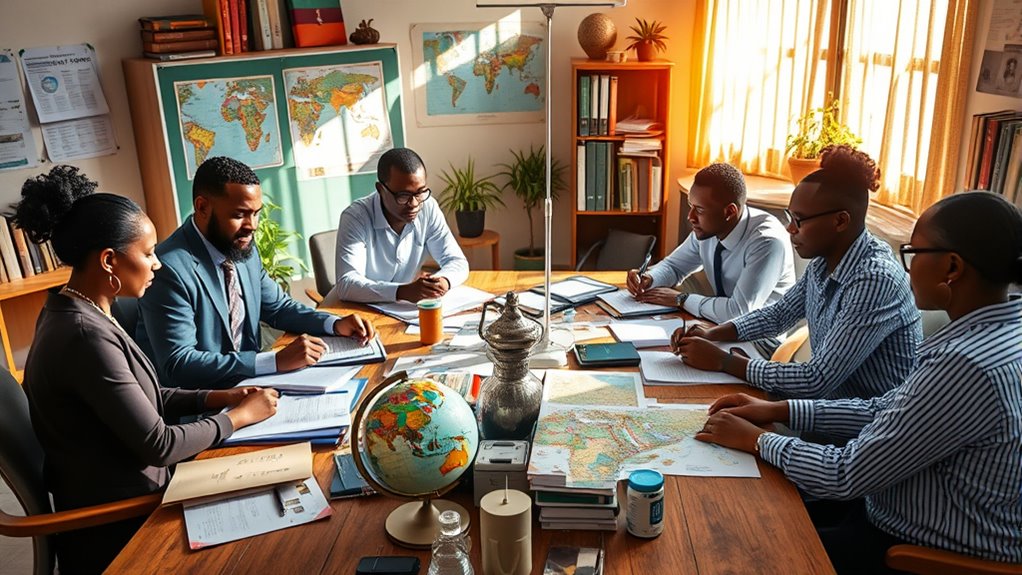Certified translation is an accurate, professionally verified conversion of documents, essential for African immigration processes to guarantee legal compliance and authenticity. Translation Africa provides expert services, employing skilled linguists for languages like French and Swahili, handling common items such as birth certificates and visas with notarized stamps to prevent rejections. This supports smoother visa applications, family reunifications, and business expansions by minimizing errors and delays. Further insights into steps and benefits lie ahead.
Quick Summaries
- Certified translations accurately render immigration documents in African languages, ensuring legal compliance and authenticity.
- Translation Africa provides expert services for translating essential documents like birth certificates and passports for immigration purposes.
- The process involves skilled linguists who deliver notarized translations to meet African immigration standards.
- Common documents such as marriage licenses benefit from certification to prevent visa rejections and streamline applications.
- These services help individuals and businesses achieve faster processing for work, education, and family reunification across Africa.
What Is Certified Translation?

Certified translation refers to the accurate rendering of a document from one language to another by a qualified professional, who verifies its fidelity through a formal certification, such as a stamp or affidavit, to meet official standards. This process guarantees that the translated content mirrors the original in meaning, terminology, and intent, minimizing errors that could alter intent. Qualified professionals, often certified by recognized bodies like translation associations, undergo rigorous training and adhere to ethical guidelines. The certification process typically involves the translator attesting to the document’s accuracy, sometimes with notarization, to establish its validity. Key elements include linguistic expertise, cultural nuance, and compliance with international standards, making certified translations essential for legal and administrative purposes. This method upholds integrity and reliability in cross-language communication.
The Role in African Immigration Processes

Certified translation holds a key position in African immigration processes by facilitating the accurate handling of essential documents. Certification guarantees that these translations meet the stringent requirements for authenticity and reliability in official submissions. This integration supports smoother navigation through immigration procedures across the continent.
Immigration Document Role
In African immigration processes, certified translations of documents play a pivotal role in verifying authenticity and ensuring compliance with legal standards. These translations facilitate seamless communication between applicants and authorities, bridging language barriers in diverse African contexts. For instance, they enable the accurate interpretation of birth certificates, passports, and educational qualifications, which are essential for visa applications and residency approvals. This process supports fair evaluations and reduces processing delays.
| Document Type | Key Role in Processes |
|---|---|
| Birth Certificate | Confirms identity and origins |
| Passport | Verifies travel and citizenship |
| Educational Diploma | Validates qualifications for work visas |
Certification in Processes
Certification processes guarantee the authenticity and legal validity of translated documents in African immigration, facilitating accurate evaluations and compliance with international standards. In African contexts, such as visa applications or refugee status determinations, certification guarantees documents withstand scrutiny from authorities like those in South Africa or Nigeria. It bridges language barriers, upholding fairness and efficiency in migration systems.
- Authenticity Verification: Certifies translations as true representations, reducing disputes over document integrity.
- Legal Compliance: Aligns with AU and national laws, guaranteeing documents meet requirements for court or embassy use.
- Fraud Prevention: Adds security layers, like notary seals, to deter counterfeit submissions in high-stakes processes.
- Streamlined Processing: Accelerates approvals by providing reliable evidence, enhancing outcomes for applicants seeking residency or asylum.
Services Provided by Translation Africa

Translation Africa delivers a range of professional services, including certified translations for immigration documents across the African continent. The company specializes in high-accuracy translations that adhere to global standards, employing skilled linguists proficient in diverse African languages. Their services encompass notarial certifications, ensuring documents are legally recognized for immigration purposes. Translation Africa prioritizes swift turnaround times without compromising quality, offering customized solutions for individuals and organizations. They maintain rigorous quality control processes, including double-checks by native speakers, to guarantee precision and reliability. Moreover, the firm provides consultation on translation best practices and supports seamless integration with immigration workflows. By focusing on confidentiality and client satisfaction, Translation Africa stands as a dependable resource for handling cross-border requirements in Africa. (124 words)
Common Documents for Certification
In the context of certified translation for immigration in Africa, common documents for certification include birth certificates and marriage licenses. These documents serve as essential proof of identity and familial ties during application processes. Understanding their role helps guarantee accurate and compliant translations.
Birth Certificates
Birth certificates rank among the most essential documents for immigration in Africa, serving as official proof of an individual’s identity, age, and parentage. These records are crucial for visa applications, citizenship claims, and border processes, where certified translations guarantee authenticity and compliance with international regulations. Without proper certification, discrepancies can delay or derail immigration proceedings.
To convey their deeper significance:
- Identity Verification: They establish a person’s existence and nationality, reducing risks of identity theft in migration contexts.
- Age Confirmation: Essential for determining eligibility in age-restricted programs, such as work permits or education visas.
- Parentage Proof: Facilitates family-based immigration by linking individuals to their lineage, supporting reunification efforts.
- Legal Integrity: Certified translations maintain document accuracy, fostering trust with foreign authorities and preventing disputes.
Marriage Licenses
Marriage licenses serve as critical documents in African immigration, verifying marital status and facilitating processes like spousal visas or family reunification. These official records, issued by government authorities, confirm the legality of unions and are essential for applications involving family migration across African borders. In countries such as Nigeria, South Africa, and Kenya, inaccuracies in translation can delay proceedings, making certified translations vital to guarantee authenticity and compliance with international standards.
Translation Africa specializes in accurate, notarized translations of marriage licenses, handling languages like French, Arabic, and Swahili. Professionals verify details such as dates, names, and signatures to prevent discrepancies that could arise from cultural or linguistic differences. For immigrants, this service streamlines the process, reducing risks of rejection by embassies or immigration offices. Ultimately, proper certification supports smoother passages, upholding the integrity of familial ties in Africa’s diverse immigration landscape.
Steps to Obtain Certified Translations
Obtaining certified translations for immigration in Africa involves a structured process that guarantees accuracy and compliance. This guarantees documents meet legal standards across various countries, minimizing rejection risks. The steps are straightforward yet critical for seamless immigration procedures.
- Identify required documents: Begin by listing all official papers, such as birth certificates or visas, that need translation to the target language, guaranteeing they align with specific immigration guidelines.
- Select a certified translator: Choose a professional or agency accredited by bodies like the American Translators Association or local equivalents, verifying their expertise in immigration-related translations.
- Prepare and translate documents: Submit originals to the translator, who will produce accurate versions and add certification stamps or notarizations as required.
- Verify and submit: Review the final translations for errors, then file them with immigration authorities, confirming they fulfill all procedural demands.
Benefits for Individuals and Businesses
Certified translations in African immigration contexts deliver key advantages for individuals and businesses, enhancing efficiency and compliance in global mobility. For individuals, they guarantee accurate document handling, reducing visa rejection risks and speeding up processes for work, education, or family reunification. This precision minimizes delays, allowing smoother shifts and access to new opportunities. Businesses gain from reliable translations that support international employee transfers, maintaining legal standards and avoiding costly errors. Certified services also streamline operations, enabling companies to expand into African markets with confidence. By fostering trust and accuracy, these translations promote economic growth and cultural exchange, ultimately lowering administrative burdens and improving success rates in immigration matters. This approach not only complies with regulations but also empowers stakeholders to navigate complexities effectively, driving overall productivity.
Frequently Asked Questions
How Much Does Certified Translation Cost?
The inquiry into the cost of certified translations is common, as prices vary widely based on factors like language pair, document length, and provider expertise. Typically, costs range from $20 to $150 per page, so obtaining multiple quotes guarantees accurate budgeting.
What Is the Typical Turnaround Time?
The question concerns the typical turnaround time for translation services. This varies by factors like document length and complexity; standard projects often take 24 to 48 hours, while larger ones may require several days to a week.
Which Languages Do You Support?
The current inquiry regarding the languages supported by the translation service reveals that it offers English, French, Spanish, Arabic, Chinese, and a wide array of African languages, including Swahili, Zulu, and Amharic, for extensive support.
Are Translators Certified Professionals?
The question of whether translators are certified professionals is essential for ensuring reliable services. Many translators undergo rigorous training and obtain certifications from recognized bodies, such as the ATA, to validate their expertise, maintain high standards, and guarantee accuracy in diverse linguistic contexts.
Do You Offer Apostille Services?
The question pertains to the availability of apostille services, which legalize documents for international use. Such services are not offered by this provider, which specializes in translation expertise instead. Users should seek dedicated agencies for apostille needs, ensuring compliance with global standards.



